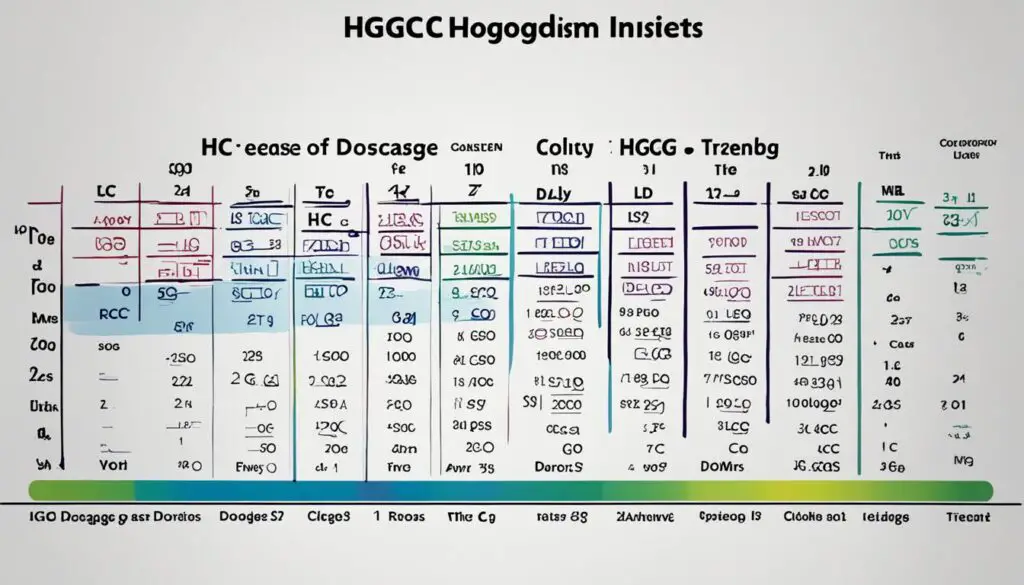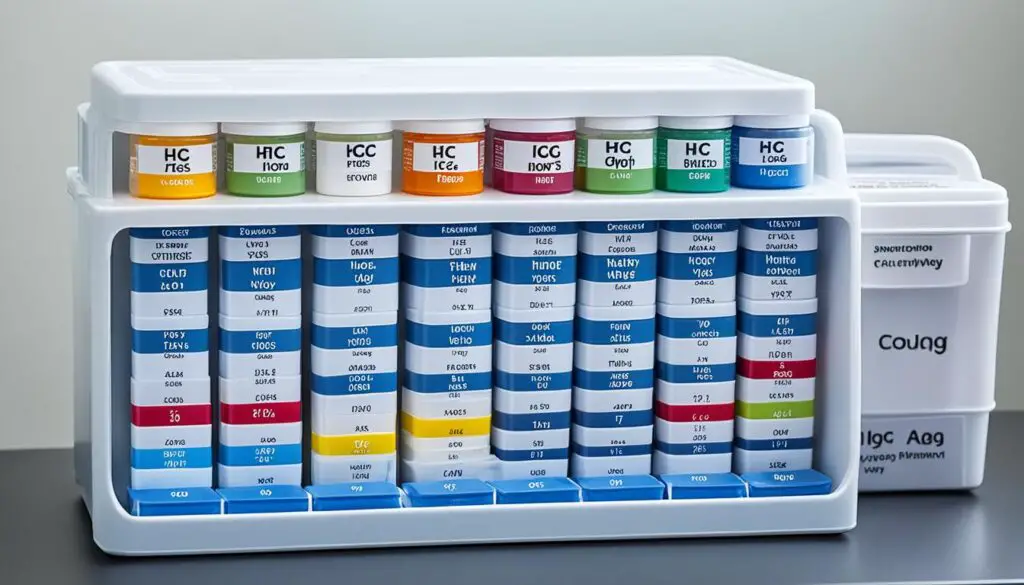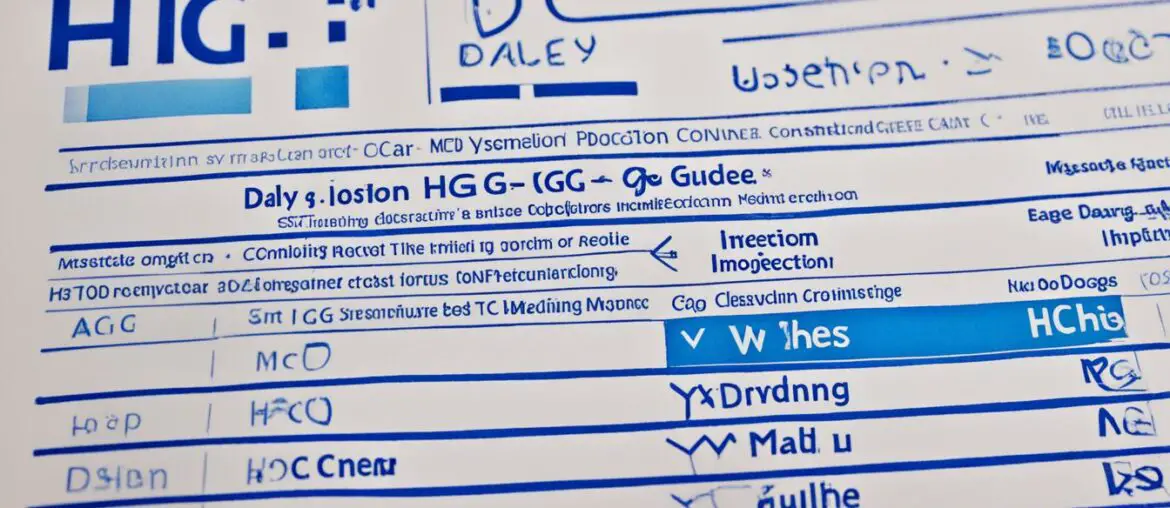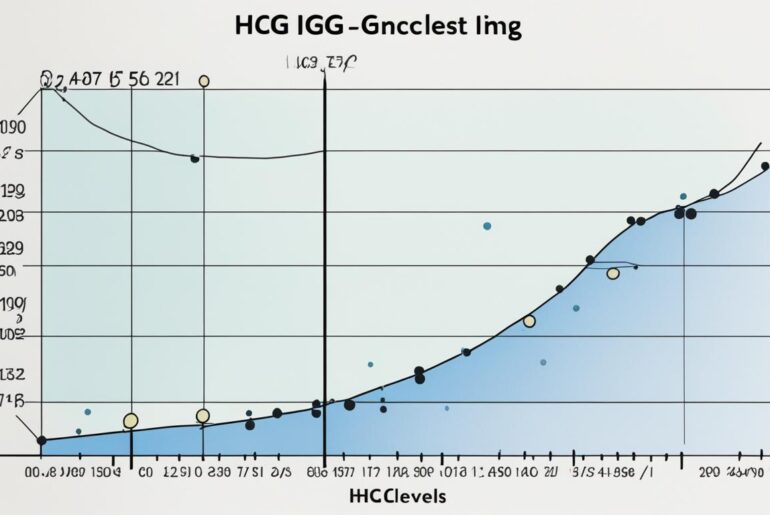Did you know that proper HCG injection dosage is a crucial factor in effective weight management and therapy? Whether you’re considering using HCG injections or currently undergoing treatment, understanding the right dosage schedule, guidelines, and instructions is essential for achieving optimal results.
Key Takeaways:
- Follow a comprehensive daily HCG injection dosage guide for weight management.
- Adhere to the recommended frequency and guidelines for optimal results.
- Consult a healthcare professional for personalized dosage recommendations and guidance.
- Ensure proper administration techniques and storage requirements.
- Combine HCG injections with a low-glycemic diet for enhanced weight loss.
Usual Adult Dose for Ovulation Induction
When it comes to ovulation induction, finding the right HCG injection dosage is crucial for successful outcomes. The usual adult dose ranges from 5000 to 10,000 units IM (intramuscular) once, usually administered one day following the last dose of menotropins. It is important to note that patients should be pretreated with human menotropins before receiving HCG injections.
In some cases, experts may recommend higher doses of HCG injection, such as 10,000 units. This decision is typically based on the patient’s specific needs and the professional judgment of the healthcare provider.
“Finding the optimum HCG injection dosage for ovulation induction requires careful consideration of individual factors and medical expertise.”
By following the recommended usual adult dose guidelines for ovulation induction, patients can increase their chances of achieving successful outcomes and realizing their fertility goals.
| Dosage Range | Usual Adult Dose |
|---|---|
| Lower Range | 5000 units IM once |
| Higher Range | 10,000 units IM once |
The table above summarizes the usual adult dose range for HCG injection in ovulation induction. It is important to consult with a healthcare professional for personalized recommendations and dosage adjustments based on individual needs and circumstances.
Usual Adult Dose for Hypogonadism – Male

In the treatment of hypogonadism in males, the usual adult dose of HCG injection varies. It can range from 500 to 1000 units IM 3 times a week for 3 weeks, then 500 to 1000 units IM 2 times a week for 3 weeks. Alternatively, a dose of 4000 units IM 3 times a week for 6 to 9 months, followed by 2000 units IM 3 times a week for 3 months, may be used.
HCG Injection Dosage for Hypogonadism – Male
Hypogonadism is characterized by low levels of testosterone in males. The usual adult dose for HCG injection in treating this condition varies depending on the individual’s specific needs and response to treatment. The HCG injection dosage for hypogonadism typically ranges from 500 to 1000 units, administered intramuscularly. The injections are generally given three times a week for a duration of three weeks, followed by two times a week for an additional three weeks. This dosing schedule helps to restore testosterone levels and alleviate the symptoms of hypogonadism.
HCG Injection Dosage Guidelines for Hypogonadism – Male
When administering HCG injections for the treatment of hypogonadism in males, it is important to follow certain dosage guidelines. The recommended dosage typically falls within the range of 500 to 1000 units, administered intramuscularly. The injections should be given three times a week for a period of three weeks, followed by two times a week for the next three weeks. The duration and frequency of treatment may vary depending on the individual’s response and the severity of the hypogonadism. Regular monitoring of hormone levels is essential to adjust the dosage as necessary.
In some cases, an alternative dosage schedule may be used, starting with a higher dose of 4000 units administered three times a week for a period of six to nine months, followed by a lower dose of 2000 units three times a week for three months. This alternative dosage schedule may be recommended for individuals who require a more aggressive approach to hormone replacement therapy.
HCG Injection Dosage Chart for Hypogonadism – Male
| Duration | Dosage | Frequency | |
|---|---|---|---|
| 3 weeks | 500-1000 units | IM, 3 times a week | |
| 3 weeks | 500-1000 units | IM, 2 times a week | |
| Alternative Dosage | 6-9 months | 4000 units | IM, 3 times a week |
| 3 months | 2000 units | IM, 3 times a week |
Note: The HCG injection dosage chart provides a general guideline for the treatment of hypogonadism in males. However, individual dosage requirements may vary, and it is important to consult with a healthcare professional for personalized dosage recommendations and guidance.
Usual Pediatric Dose for Prepubertal Cryptorchidism
Prepubertal cryptorchidism, a condition where the testes fail to descend into the scrotum, is commonly treated with HCG injections in children aged 4 years and older. The usual pediatric dose of HCG injection for prepubertal cryptorchidism is 4000 units IM 3 times a week for 3 weeks. This treatment regimen has shown positive outcomes in promoting testicular descent and improving fertility potential.
In some cases, alternative dosing options may be considered based on the specific needs of the patient. One alternative is a dose of 5000 units IM every other day for 4 injections. Another option involves administering 500 to 1000 units IM for 15 injections over a period of 6 weeks. These alternatives allow for individualized treatment strategies, ensuring the best possible outcome for each child.
Benefits of HCG Injection for Prepubertal Cryptorchidism
HCG injection therapy offers several benefits for the treatment of prepubertal cryptorchidism. It stimulates the production of testosterone, which is essential for the normal development and descent of the testes. By promoting testicular descent, HCG injections aid in reducing the risk of complications, such as impaired spermatogenesis and testicular cancer, later in life.
| Dose | Administration Frequency | Treatment Duration |
|---|---|---|
| 4000 units IM | 3 times a week | 3 weeks |
| 5000 units IM | Every other day | 4 injections |
| 500 to 1000 units IM | Once daily | 15 injections over 6 weeks |
Administering HCG injection therapy for prepubertal cryptorchidism requires careful evaluation and monitoring by a qualified healthcare professional. Individualized treatment plans should consider the child’s age, medical history, and overall health. Close follow-up with regular testicular examinations is essential to assess the progress and effectiveness of the treatment.
It is important to note that the use of HCG injection therapy for prepubertal cryptorchidism is supported by clinical evidence and has been widely accepted as an effective treatment option. However, as with any medical intervention, there may be potential risks and side effects. Therefore, consultation with a knowledgeable healthcare professional is crucial to ensure appropriate treatment and optimal outcomes.
Renal and Liver Dose Adjustments

When administering HCG injection, it is important to consider the potential need for dose adjustments in patients with renal or liver impairment. Patients with these conditions may require modified HCG injection dosages to ensure safety and efficacy.
Patients with renal dysfunction may experience changes in drug metabolism and excretion, which can impact the clearance of HCG from their system. Similarly, patients with liver impairment may have altered drug metabolism, potentially affecting the breakdown and elimination of HCG.
Due to the lack of specific data on renal and liver dose adjustments for HCG injection, caution should be exercised when administering the medication to patients with these conditions. It is crucial to consult with a healthcare provider who can assess the individual’s renal or liver function and provide appropriate dosage recommendations.
By considering renal and liver dose adjustments, healthcare professionals can tailor the HCG injection dosage to suit the patient’s specific needs, ensuring effective and safe treatment.
Potential Renal Dose Adjustments
1. Reduce the HCG injection dosage in patients with severe renal impairment.
2. Increase the dosing interval or decrease the frequency in patients with mild to moderate renal impairment.
3. Monitoring renal function throughout the treatment duration is advised to assess the need for further dosage adjustments.
Potential Liver Dose Adjustments
1. Modify the HCG injection dosage in patients with impaired hepatic function, considering the altered drug metabolism.
2. Close monitoring of liver function is recommended to determine the need for dosage alterations during the course of treatment.
| Patient Condition | Renal Dose Adjustments | Liver Dose Adjustments |
|---|---|---|
| Renal Impairment | Individualized dosage based on renal function | Assess hepatic function for potential adjustments |
| Liver Impairment | Consider renal function for dosage modifications | Adjust dosage based on hepatic function |
Precautions and Other Comments
When administering HCG injection, certain precautions should be taken to ensure safe and effective use. It is important for patients to be appropriately pretreated with human menotropins before initiating HCG therapy. This helps optimize the response to treatment and enhances the overall outcomes.
r-HCG should not be given until adequate follicular development is indicated. This is crucial for achieving the desired effects and avoiding any potential complications. Adequate follicular development is an essential step in the treatment process and should be closely monitored by a healthcare professional.
Treatment should be withheld in patients with excessive ovarian response. This precaution is important for preventing the risk of ovarian hyperstimulation syndrome (OHSS), a potentially serious condition associated with HCG therapy. Monitoring the patient’s response and adjusting the dosage or treatment schedule accordingly can help mitigate this risk.
Safety and efficacy of HCG have not been established in patients younger than 4 years. Therefore, it is important to exercise caution and consider alternative treatment options for pediatric patients below this age group. Consulting with a healthcare provider is essential to ensure the appropriate management of these patients.
Consult the WARNINGS section for additional precautions and contraindications associated with HCG injection. It is essential to carefully review all relevant safety information before initiating treatment.
It is important to note that these precautions and other comments are general guidelines and may vary depending on the individual patient’s condition and medical history. Consulting with a healthcare professional is crucial for personalized dosage recommendations and guidance.
Summary of Precautions and Other Comments:
| Precautions | Other Comments |
|---|---|
| Patients should be pretreated with human menotropins | r-HCG should not be given until adequate follicular development is indicated |
| Treatment should be withheld in patients with excessive ovarian response | Safety and efficacy of HCG have not been established in patients younger than 4 years |
Administration and Storage Requirements

Administering HCG injections involves a careful process that should only be carried out by healthcare professionals or patients who have received proper training. It is crucial to follow the required administration techniques, including maintaining sterility throughout the procedure. Sterile techniques ensure the safety and effectiveness of the HCG injection.
Proper disposal of needles and syringes is essential to prevent injury and contamination. After use, needles and syringes should be immediately disposed of in a sealable, puncture-resistant container. This helps protect others from accidental needle stick injuries and minimizes environmental risks.
The storage requirements for HCG injections may vary depending on the specific formulation. For detailed and accurate information regarding storage guidelines, it is recommended to consult the manufacturer’s product information. Adhering to the appropriate storage conditions ensures the stability and reliability of the medication.
Proper HCG Injection Administration
When administering HCG injections, the following steps should typically be followed:
- Wash hands thoroughly with soap and water.
- Gather the necessary supplies, including the HCG vial, syringe, and alcohol swabs.
- Cleanse the injection site with an alcohol swab.
- Prepare the syringe by removing the needle cap and drawing the appropriate dosage of HCG.
- Gently tap the syringe to remove air bubbles and ensure accurate measurement.
- Insert the needle into the cleaned injection site at the recommended angle.
- Inject the HCG slowly and steadily.
- Remove the needle and apply a fresh alcohol swab to the injection site.
- Dispose of the used needle and syringe in a puncture-resistant container.
Remember, it is important to always consult with a healthcare professional for personalized dosage recommendations and guidance specific to your condition.
| Administration Guidelines | Storage Requirements |
|---|---|
| Administer HCG dosage by trained professionals or self-administering patients | Follow manufacturer’s guidelines for proper storage conditions |
| Ensure sterile techniques during administration to minimize the risk of infection | Protect HCG injections from light and extreme temperatures |
| Properly dispose of needles and syringes in puncture-resistant containers | Avoid freezing or excessive heat exposure |
Reconstitution and Preparation Techniques
When it comes to reconstituting HCG injection, following the appropriate techniques is essential for ensuring its effectiveness. The manufacturer’s product information provides detailed instructions on the reconstitution process, so it’s important to consult that information for accurate guidance.
Proper dissolution of the medication before administration is crucial for achieving the desired outcomes. Avoid skipping or rushing this step, as it can impact the drug’s potency and efficacy.
Below is a step-by-step guide for reconstituting HCG injection:
- Begin by gathering all the necessary materials, including the HCG vial, sterile water, a syringe, and a needle.
- Wash your hands thoroughly with soap and warm water, then dry them with a clean towel.
- Remove the cap from the HCG vial and wipe the rubber stopper with an alcohol pad to ensure sterility.
- Take the syringe and draw the recommended amount of sterile water as instructed by your healthcare provider. (Note: The amount of sterile water may vary depending on the dosage prescribed.)
- Remove the protective cap from the needle and insert it into the sterile water vial.
- Inject the sterile water into the HCG vial slowly. Be cautious not to create excessive pressure or forcefully inject the water, as it may cause foaming.
- Once all the sterile water is transferred, gently swirl the HCG vial in a circular motion until the powder is fully dissolved. Avoid shaking the vial vigorously.
- Inspect the solution for any undissolved particles. If any are visible, continue gently swirling the vial until all particles are dissolved.
- After reconstitution, the HCG injection is ready for administration. Follow the recommended dosage and administration guidelines provided by your healthcare provider.
Remember, it is crucial to follow the specific reconstitution and preparation techniques to ensure the proper dissolution of HCG injection. This will help maximize its effectiveness and achieve the desired results in weight management and therapy.
It’s important to note that the reconstituted HCG solution should be used immediately or as directed by your healthcare provider. Do not store or reuse any leftover solution.
| Reconstitution Steps | Important Points to Remember |
|---|---|
| 1. Gather necessary materials | – Ensure everything is clean and sterile – Use the recommended sterile water |
| 2. Wash hands thoroughly | – Follow proper hand hygiene to prevent contamination |
| 3. Prepare the HCG vial | – Wipe the rubber stopper with an alcohol pad to maintain sterility |
| 4. Draw sterile water into the syringe | – Be precise with the recommended volume of sterile water – Use a clean syringe and needle |
| 5. Insert the needle into the sterile water vial | – Ensure the needle is properly aligned and securely attached |
| 6. Inject the sterile water into the HCG vial | – Avoid creating excessive pressure or forcibly injecting the water |
| 7. Gently swirl the HCG vial to dissolve the powder | – Use a circular motion to dissolve the powder effectively – Do not shake the vial vigorously |
| 8. Inspect the solution for undissolved particles | – Ensure there are no visible particles in the solution – Continue swirling if any particles are present |
| 9. Follow the recommended dosage and administration guidelines | – Only use the reconstituted solution immediately or as directed – Dispose of any leftover solution according to proper disposal guidelines |
HCG and Weight Management

In the realm of weight management, HCG injection plays a significant role. As a common component of weight management programs, it has gained traction for its potential to assist in achieving weight loss goals and reducing cravings. Additionally, HCG injection has shown promise in predicting whether orchiopexy, a surgical procedure to correct prepubertal cryptorchidism, will be necessary in patients.
When utilizing HCG injection for weight management, it is essential to adopt a comprehensive approach. The HCG diet, in combination with the injections, has yielded successful weight loss outcomes for many individuals. However, to maximize results, adherence to a low-glycemic diet is crucial. This dietary approach focuses on minimizing the consumption of high-glycemic foods, which can cause blood sugar spikes and hinder weight loss progress.
When it comes to weight management, combining HCG injections with a low-glycemic diet can be a powerful approach. By integrating these two components, individuals can optimize their weight loss results and pave the way for a healthier lifestyle.
HCG and Cravings
One notable aspect of HCG injection in weight management relates to its impact on cravings. With the inclusion of HCG, individuals often experience a reduction in appetite and cravings, particularly for high-calorie and sugary foods. This can be a significant advantage for those seeking to break free from unhealthy eating habits and maintain better control over their dietary choices.
Personalized Approach
It is important to note that weight management is a highly individualized journey. For personalized dosage recommendations and guidance in incorporating HCG injection into your weight management program, consulting with a healthcare professional is advised. They can provide tailored advice based on your specific needs and goals, ensuring you embark on a safe and effective path towards weight management success.
HCG Injection Dosage for Weight Management
| Weight Management Phase | HCG Injection Dosage | Duration |
|---|---|---|
| Phase 1: Loading Phase | 125-200 IU | 2 days |
| Phase 2: Weight Loss Phase | 125-200 IU | 3-6 weeks |
| Phase 3: Stabilization Phase | N/A | 3 weeks |
| Phase 4: Maintenance Phase | N/A | Varies |
Hormone Imbalance and Weight

Hormone imbalance can have a significant impact on weight management and make it challenging to lose weight. When hormones are out of balance, it can disrupt the body’s natural processes and create physical and mental barriers to fat burning and weight loss.
That’s why at our practice, we take a comprehensive approach to weight management by combining HCG injections with hormone testing and treatment. By addressing hormone imbalances alongside HCG therapy, we can target the underlying factors that contribute to weight gain and optimize the effectiveness of the treatment.
HCG injections help stimulate the metabolism and promote fat burning, while hormone testing allows us to identify specific imbalances that may be hindering weight loss. Once we have a clear understanding of the hormone imbalances, we can develop personalized treatment plans to restore balance and support the weight loss journey.
By integrating HCG injections with hormone testing and treatment, we can enhance the overall effectiveness of weight management strategies. This approach not only helps individuals achieve their weight loss goals but also improves overall well-being and promotes sustainable results.
Benefits of Combining HCG Injections with Hormone Treatment
- Targeting hormone imbalances that contribute to weight gain
- Promoting optimal fat burning and metabolism
- Enhancing weight loss success and sustainability
- Improving overall well-being and vitality
Addressing hormone imbalances alongside HCG therapy can help break through weight loss plateaus and achieve long-term results. It is a comprehensive approach to weight management that considers the unique needs of each individual.
With our integrated approach, we aim to optimize the benefits of HCG injections while addressing the root causes of weight gain. By restoring hormonal balance, individuals can overcome the challenges posed by hormone imbalances and achieve their desired weight loss outcomes.
| Hormone Imbalance Symptoms | Effects on Weight Management |
|---|---|
| Irregular menstrual cycles | Disruption of hormonal signaling for appetite and metabolism |
| Low energy levels | Reduced physical activity and slower metabolism |
| Insomnia or poor sleep quality | Disrupted hunger and satiety hormone levels |
| Mood swings and irritability | Emotional eating and cravings for unhealthy foods |
By addressing hormone imbalances and supporting weight management with HCG injections, we can provide a comprehensive solution that goes beyond traditional weight loss approaches. If you’re struggling with weight loss, consider exploring the role of hormone balance and consult with our healthcare professionals for personalized guidance and support.
Conclusion
Proper dosage administration is crucial for the effectiveness of HCG injection in weight management and therapy. By following the recommended dosage schedule, guidelines, and instructions, individuals can optimize their HCG treatment and achieve their weight loss goals. However, it is important to consult with a healthcare professional for personalized dosage recommendations and guidance.
When administering HCG injections, safety should always be a top priority. It is essential to follow all precautions and ensure that sterile techniques are employed in the administration process. Additionally, individuals should dispose of needles and syringes in a sealable, puncture-resistant container to prevent any potential harm.
HCG injection dosage plays a crucial role in the success of weight management programs. By adhering to the Daily HCG Injection Dosage Guide and combining it with a low-glycemic diet, individuals can experience significant weight loss and reduced cravings. Remember, achieving and maintaining optimal results requires ongoing commitment to the prescribed dosage and a healthy lifestyle.
FAQ
What is the usual adult dose for ovulation induction?
The usual adult dose of HCG injection for ovulation induction ranges from 5000 to 10,000 units IM once, 1 day following the last dose of menotropins. Some experts may recommend HCG doses of 10,000 units.
What is the usual adult dose for hypogonadism in males?
The usual adult dose of HCG injection for hypogonadism in males varies. It can range from 500 to 1000 units IM 3 times a week for 3 weeks, then 500 to 1000 units IM 2 times a week for 3 weeks. Alternatively, a dose of 4000 units IM 3 times a week for 6 to 9 months, followed by 2000 units IM 3 times a week for 3 months, may be used.
What is the usual pediatric dose for prepubertal cryptorchidism?
The usual pediatric dose of HCG injection for prepubertal cryptorchidism is 4000 units IM 3 times a week for 3 weeks. In some cases, a dose of 5000 units IM every other day for 4 injections, or 500 to 1000 units IM for 15 injections over a period of 6 weeks, may be prescribed.
Are there any dose adjustments for patients with renal or liver impairment?
HCG injection dosage adjustments may be necessary for patients with renal or liver impairment. It is important to use caution and consult with a healthcare provider when administering HCG to patients with these conditions. Data on specific dose adjustments for renal and liver dysfunction is not available.
What precautions should be taken when administering HCG injection?
When administering HCG injection, patients should be appropriately pretreated with human menotropins. r-HCG should not be given until adequate follicular development is indicated. Treatment should be withheld in patients with excessive ovarian response. Safety and efficacy of HCG have not been established in patients younger than 4 years. Please consult the WARNINGS section for additional precautions.
Who should administer HCG injection?
HCG injection should be administered by healthcare professionals or patients who are motivated and adequately trained. Proper administration techniques, including sterile techniques, should be followed. Needles and syringes should be disposed of in a sealable, puncture-resistant container. Storage requirements vary depending on the formulation. Please consult the manufacturer’s product information for specific details.
How should HCG injection be reconstituted?
When reconstituting HCG injection, specific techniques should be followed. The manufacturer’s product information should be consulted for detailed instructions on the reconstitution process. It is important to ensure proper dissolution of the medication before administration.
Can HCG injection be used for weight management?
Yes, HCG injection is commonly used in weight management programs. It can aid in weight loss and reducing cravings when combined with a low-glycemic diet. However, it is important to follow the recommended dosage schedule and consult with a healthcare professional for personalized guidance and dosage recommendations.
Can hormone imbalance affect weight?
Hormone imbalance can contribute to weight gain and make it difficult to lose weight. Balancing hormones can help break down physical and mental barriers to fat burning and weight loss. Combining HCG injections with hormone testing and treatment can help achieve optimal weight loss results.
Why is proper dosage administration important for HCG injection?
Proper dosage administration is crucial for the effectiveness of HCG injection in weight management and therapy. Following the recommended dosage schedule, guidelines, and instructions can help individuals achieve their weight loss goals. It is important to prioritize safety and follow all precautions when administering HCG injections. Consult with a healthcare professional for personalized dosage recommendations and guidance.




